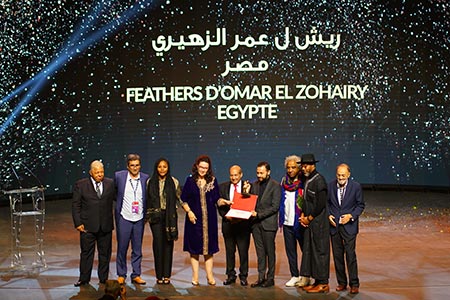 From October 30 to November 6, Tunisia was marked by the 32nd Edition of Carthage Film Festival (JCC). This Edition celebrates the reunion with Cinema and renew after the gloominess imposed by the pandemic the public with movie theaters. The JCC is an opportunity to discover exceptional films and make great encounters.
From October 30 to November 6, Tunisia was marked by the 32nd Edition of Carthage Film Festival (JCC). This Edition celebrates the reunion with Cinema and renew after the gloominess imposed by the pandemic the public with movie theaters. The JCC is an opportunity to discover exceptional films and make great encounters.
Nejib Belkadhi, master of the closing ceremony, blew on the stage of the room Opera in the City of Culture, the final whistle of this Edition in presence of an audience of Tunisian, Arab, African and international guests.
The General Director of the JCC, Ridha Béhi welcomed the success of this Edition, and expressed how proud and grateful he is to the entire team of the festival. M. Béhi stressed that despite some shortcomings, this edition has served its purpose by selecting Tunisian, Arab, African and international films of quality and renown, and by organizing round tables generating highly enriching and constructive exchanges. He also emphasized the success of some sections of the JCC, such as “JCC in Barracks”, “Visions Libya”, “Visions Belgium”, “Adaptations” or the awards given to artists and technicians Tunisian, Arab, African and international.
A short fiction movie produced and directed by the detainees of Mahdia Prison was screened during the Closure Ceremony.
The list of winners was unveiled as the different video summaries on the highlights of the JCC were screened.
“Ciné Promesse” Award
The jury is composed of Lina Chaabane (Tunisia), Fatou Kiné Siné (Senegal) and Nicole Kamato (Lebanon). 10 films are in competition. The prize was awarded by Lassaad Zarrouk, General Director of the Mutuelle Assurance de l’Enseignement (MAE)
THE GIRLS WHO BURNED THE NIGHT by Sara Mesfer (Saudi Arabia)
Lina Ben Mhenni Award
The jury is composed of Bochra Belhaj Hmida (Tunisia), Hechmi Ben Fraj (Tunisia), and Sarah Berthou (France). The prize was awarded by Lina’s Father: The activist Sadok Ben Mhenni
AS I WANT by Samaher Al Qadi (Palestine)
Tahar Cheriaa Prize
The jury is composed of Sékou Traoré (Burkina Faso), Basma (Egypt), and Ramses Mahfoudh (Tunisia).
First Film Jury prize: FEATHERS by Omar El Zohairy - Egypt
TV5 Monde Prize: LITTLE PALESTINE by Abdalla Al Khatib – Palestine
Special Mention: Captains of Zaatari by Ali Al Arabi - Egypt
Long and Short Documentaries
The jury is composed of Chloé Aïcha Boro (Burkina Faso), Nujoom Al-Ghanem (UAE), Sophie Salbot (France), Michelle de la Rochefoucauld (France), Hamza Ouni (Tunisia) and Necati Sönmez (Turkey).
Short documentaries
9 films were selected in this competition.
Bronze Tanit: DON’T GET TOO COMFORTABLE by Shaima Al Tamimi – Yemen
Silver Tanit: AND THEN THEY BURN THE SEA by Majid Al-Ramaihi - Qatar
Golden Tanit: SHEPHERDS by TEBOHO EDKINS – South Africa
Long Documentaries
13 films were selected in this competition.
Bronze Tanit: AS I WANT by Samaher AlQadi - Palestine
Silver Tanit: THE LAST SHELTER by SAMASSÉKOU OUSMANE - MALI
Golden Tanit: LITTLE PALESTINE, DIARY OF A SIEGE by ABDALLAH AL-KHATIB – PALESTINE
Feature and Short Fiction Films Award
The jury is composed of Enzo Porcelli (Italy), Hoji Fortuna (Angola), Tarek El Shennawy (Egypt), Gessica Fabiota Geneus (Haiti), Daoud Aoulad-Syad (Morocco), Ahmed Bahrami (Iran) and Sofiane Ben Farhat (Tunisia).
Short Fiction Film Award
12 films were selected in this competition.
Bronze Tanit: IN UNCLE SALEM COUNTRY by Slim Belhiba - Tunisia
Silver Tanit: HOW MY GRANDMOTHER BECAME A CHAIR by NICOLAS FATTOUH - LEBANON
Golden Tanit: LIFE ON THE HORN by MO HARAWE – SOMALIA
Long Fiction Film Award
12 films were selected in this competition.
Prize for Best Editing awarded by Fakherddine Amri: THIS IS NOT BURIAL, IT’S RESURRECTION by LEMOHANG JEREMIAH MOSESE - LESOTHO
Prize for Best Photography awarded by Ahmed Bennys: THIS IS NOT BURIAL, IT’S RESURRECTION by LEMOHANG JEREMIAH MOSESE - LESOTHO
Prize for Best Music awarded by Fedi Ben Othman: CASABLANCA BEATS by Nabil Ayouch - Morocco
Prize for Best Screenplay awarded by Raja Laamari: FEATHERS by Omar El Zohairy - Egypt
Prize for Best Male Performance awarded by Nadia Bousetta : Omar Abdi for his role in THE GRAVEDIGGER’S WIFE - Somalia
Prize for Best Female Performance by Helmi Dridi: Demyana Nassar for her role in FEATHERS by Omar El Zohairy – Egypt
Special Mention: “AMIRA” by Mohamed Diab – Egypt
Special Mention: “Golden Butterfly” by AbdelHamid Bouchnak - Tunisia
Bronze Tanit for Feature Fiction Film awarded by Slim Darguechi
INSURRECTION by Jilani Saadi - Tunisia
Silver Tanit for Feature Fiction Film awarded by Ridha Béhi:
THIS IS NOT BURIAL, IT’S RESURRECTION by Lemohang Jeremiah Mosese - Lesotho
Golden Tanit for Feature Fiction Film awarded by the Minister of Cultural Affairs, Hayet Guettat Guermazi:
FEATHERS by Omar El Zohairy - Egypt
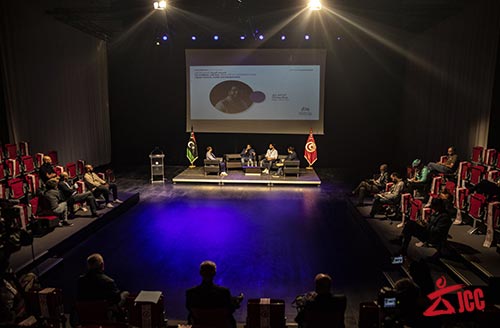 Libyan cinema is anchored in history and the industry professionals have contributed to the influence of Libyan culture. However, the political climate of recent decades has hampered its development.
Libyan cinema is anchored in history and the industry professionals have contributed to the influence of Libyan culture. However, the political climate of recent decades has hampered its development.
Nevertheless, Libyan directors did not give up and tried to push their way through forming little niches of resistance. During the last decade, a wind of freedom has blown over the country, revealing a new generation of filmmakers who aspire to promote their cinema on a Maghrebian, Arab and international scale.
Libyan cinema participates at the 32nd Edition of the JCC with four feature films and 11 short films. Those films are the most important in the JCC since 1977. Several young Libyan filmmakers are also present.
This Edition of the JCC honors Libya with the section “Visions Libya”. It was in this context that a meeting was organized on November 4 at the City of Culture with professionals from the Libyan cinema industry.
This meeting was moderated by Radhwen Ayadi, who look at the history of Libyan cinema but also at its current challenges.
The Libyan director and producer Oussama Rezg pointed out that the history of cinema in Libya dates back to 1911 with the advent of Italian colonization. Until 1966, there were over 15 cinemas in Tripoli, the capital of Libya, and two cinemas in Benghazi. Currently, there are no more movie theaters. He also said that for half a century Libya has produced only 130 films between short and feature films. These films have nevertheless been the subject of great censorship. Rezg noted that Libyan films produced before 2011 have not had great success with Libyan audiences, nor Arab or international influence, with the exception of the films “Al Rissala” and “Omar Al Mokhtar”.
The marginalization of the sector by the Libyan authorities persists. It pushed young Libyan directors to look for other ways. The producer invoked, in this sense, the role of platforms, like “Rouaa” (Visions in English), for the revitalization of the sector, while awaiting the structuring of the cultural sphere in the country.
The documentary filmmaker and director of the company “Libya for Films” unveiled his company’s plan to launch an internet platform bringing together all the players in the sector. They have 250 directors and technicians listed so far, he said. This platform aims to build bridges between the various professionals in the field and to be able to organize film events. The ultimate goal is to bring a new cinematic era to the country.
The young Libyan director Muhannad Lamin, winner of “Chabaka” workshop price of the “Carthage pro” section during this edition of the JCC, talked about the difficulties of making films in Libya, in particular the inexistence of a legal framework governing production and distribution companies, and the security instability that they are facing. In his opinion, Tunisia is the lifeline of young Libyans who dream of making films.
The rest of speakers insisted on the need to strengthen Tunisian-Libyan collaboration in this sector. They also mentioned the importance of North African coordination regarding platforms.
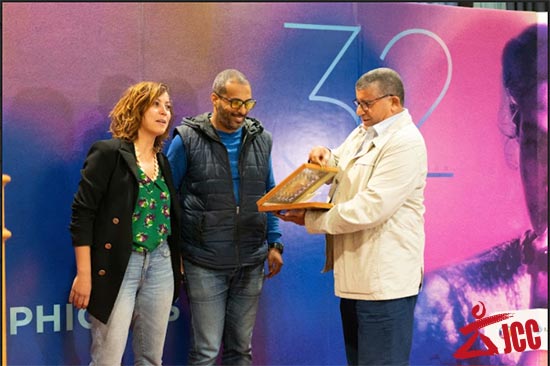 Organization and Association’s awards for the 32nd Edition of Carthage Film Festival
Since its creation, Carthage Film Festival has been giving opportunity for Tunisian, African and international human rights organizations, associations and bodies that defend freedoms and great human values to interact with the festival's principles
Organization and Association’s awards for the 32nd Edition of Carthage Film Festival
Since its creation, Carthage Film Festival has been giving opportunity for Tunisian, African and international human rights organizations, associations and bodies that defend freedoms and great human values to interact with the festival's principles
Three important prizes were announced on November 3, 2021:
- Best mixing award from the General Union of Tunisian Workers (UGTT).
The jury is composed of the Director Kawthar Hamri (Tunisia), the actor Lassaad Jamoussi (Tunisia) and the sound mixing engineer Sami Gharbi (Tunisia).
The winner is:
Saber Kablaoui for the documentary "Sur les traces des lettres" by Mohamed Salah Argui (Tunisia)
- The prize of the International Federation of Film Press FIPRESCI
The jury is composed of the French author, film critic and consultant Nadia Meftaf, the Ukrainian journalist, film critic and director Elena Rubashevsha, and the Tunisian journalist and film critic Samira Dami.
The winner is:
“The Indomitable Spring Fire” by Lesotho filmmaker Lemohang Jeremiah Mosese
- The prize of the African Federation of Film Critics (FACC)
The jury is composed up of the Congolese journalist and film critic Georges Nzuzi Salambiaku, the Nigerian journalist and film critic Franklin Chukwunonso Ugobude, and the Tunisian journalist, film critic and director Narjes Torchani. 11 African films took part in the official feature film competition.
The winner is:
“Argu” by Omar Belkacemi (Algeria)
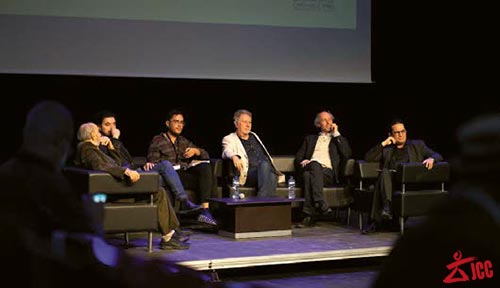 The 32nd Edition of Film Festival (JCC) celebrated Belgian cinema by programming films and organizing a round table on the particularities of this cinema and the prospects of connection between Tunisia and Belgium. This meeting took place on November 5, at the City of Culture.
The 32nd Edition of Film Festival (JCC) celebrated Belgian cinema by programming films and organizing a round table on the particularities of this cinema and the prospects of connection between Tunisia and Belgium. This meeting took place on November 5, at the City of Culture.
Belgium was selected because of the tremendous vitality of its cinema, affirmed, on the occasion, the artistic director of the JCC, Kamel Ben Ouanes. It also fits the editorial line of the festival, which focuses on cinema from the South but also put spotlight on cinema from the North with openness and dialogue in mind, especially since most of films from the South are co-produced by countries of the North.
The round table was moderated by the journalist Haithem Haouel. The speakers were the Tunisians, Hassen Daldoul, producer and director of films, the director Selim Gribaa, the director Sarra Abidi, the director of post-production, Sahbi Kraeim and Slim Dargachi, General Director of the CNCI. There were also from Belgium the director Thierry Michel and Christian Saelens, General Director of Wallonie Bruxelles.
Installed in Belgium for ten years, Sahbi Kraiem described an indefinable Belgian cinema because of its linguistic and cultural wealth. Indeed, the linguistic diversity of the country has paved the way for different cinemas but come together. Francophone cinema could inspire Tunisian cinema with its desire for high standards and openness. As for the Flemish cinema, it is rather influenced by the English-speaking cinema, noted Kraiem. Belgium is also characterized by its openness by welcoming several directors around the world and by embarking on co-productions.
Hassen Daldoul pointed out that the history of Tunisian-Belgian cooperation dates back to the 1950s and was initiated by his film “Le fils d'Amr est mort” in 1973. He added that Belgian and Tunisian cinema were seeking to liberate from hegemony: French hegemony for the first and Arabic one for the second.
Sarra Abidi praised the uninhibited character of Belgian cinema which allows affinities with cinema from the South. In her opinion, through cooperation with Belgium, it is possible to make low-budget films, going off the beaten track but sticking to the demand for quality and the quest for the universal.
Selim Gribaa emphasized that the attractiveness of the collaboration with the Belgians, particularly in the post-production phase, and this country’s know-how in the finalization of films.
As for Thierry Michel, talked about the specificities of Belgian cinema through the various film financing structures in Belgium but also the specificity of French-speaking cinema in particular. He thus underlined the cosmopolitan nature of Brussels cinema. This plurality is also reflected by the internationalization of aesthetics and themes generated by the presence of filmmakers from different countries on its territory. He praised the vitality of his country’s cinema, as evidenced by its presence at the Cannes Film Festival in 2021 with 10 films.
Regarding the prospects for collaboration between Belgian cinema and Tunisian cinema, Christian Saelens emphasized what he calls founding achievements which call for others, citing the successes of “N’hebek Hédi” , “Noura dreams” or “The man who sold his skin”.
Like Hassen Daldoul, Sahbi Kraeim regretted that in these co-productions, the technicians were harmed by being paid less than their Belgian colleagues. They are hoping that this issue deserves reflections and outcomes.
Facing the demand for the creation of a Tunisian-Belgian common fund, Slim Dargachi, General Director of the CNCI indicated that the Belgian regulations do not allow the launch of such a fund but the CNCI and the Belgian Center of Cinema and Audiovisual are in the process of updating the bilateral co-production agreement between the two countries dating from 1997. This update will allow a more equitable and fruitful exchange.
He also mentioned the cooperation agreement between the two countries which covers the period between 2019 and 2023. This agreement allows cooperation on the components: heritage, institutions (between the Tunisian film library and the Royal Belgian film library) and on training in through exchanges between training establishments in the two countries. The General Director of Wallonia Brussels has indicated that meetings between professionals in the sector, at a standstill during the Covid-19, will resume soon. They aim, among other things, to initiate new projects.
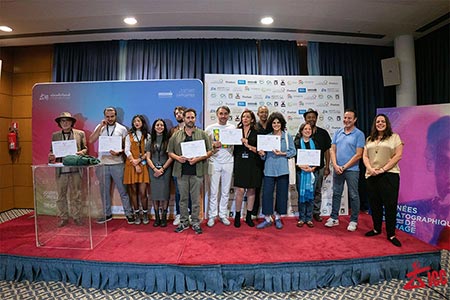 Since its creation in 2014, Takmil has supported no less than 47 films in the post-production phase. For Chabaka, 11 projects in development have been supported since the launch of the competition in 2018.
Since its creation in 2014, Takmil has supported no less than 47 films in the post-production phase. For Chabaka, 11 projects in development have been supported since the launch of the competition in 2018.
The jury composed of Habib Attia, Jessica Khoury and Christophe Rolin deliberated on November 3, 2021. After attending the presentations of the 8 projects under development ‘Chabaka’ and viewing 7 working copies 'Takmil', the prize list is as follows:
Chabaka Workshop:
OIF Prize 10,000 EUR: Donga by Muhannad Lamin
CNCI Prize 10,000 TND: Dar el Bacha sur la voie des lumières by Nawfel Saheb-Ettaba
MAE Prize 7,000 TND: The Killing of a Beast by Vusi Africa
Durban Prize (participation in Durban FilmMart in 2022): Le Chameau Manquant by Cheick N’diaye
Takmil Workshop:
OIF Prize 10,000 EUR: Hayech Mayech by Hicham Lasri
Cedars Art Production - Sabbah Brothers Prize 10,000 dollars: Sitabaomba by Nantenaina Lova
CNCI Prize 10,000 TND: La couleur du phosphate by Ridha Tlili
Charbon Studio Prize (post-production service offer 7,000 EUR): Sitabaomba by Nantenaina Lova
Malmoe Arab Film Festival Prize (invitation to participate in MAFF Industry Days): La couleur du phosphate by Ridha Tlili
IFT Prize 5,000 EUR: Dirty, Difficult, Dangerous by Wissam Charaf
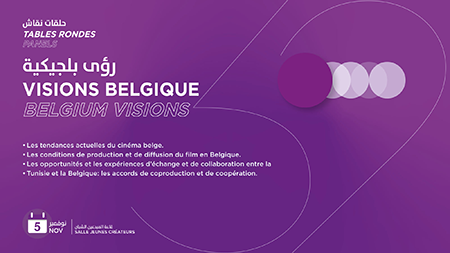 For its 32nd Edition, Carthage Film Festival (JCC) is celebrating Belgian cinema. In this context, the premiere of the film “The Empire of Silence” by the Belgian director Thierry Michel will take place on Thursday November 4 at 6 p.m. at Le Palace in the presence of the director, the Wallonia Brussels delegate and the artistic director of the festival.
For its 32nd Edition, Carthage Film Festival (JCC) is celebrating Belgian cinema. In this context, the premiere of the film “The Empire of Silence” by the Belgian director Thierry Michel will take place on Thursday November 4 at 6 p.m. at Le Palace in the presence of the director, the Wallonia Brussels delegate and the artistic director of the festival.
Thierry Michel was born in Charleroi in Belgium on 13 October 1952. He teaches “real cinema” at the Institut des Arts de Diffusion and at the University of Liège and conducts numerous seminars on writing and documentary production all over the world.
Thierry Michel is filmmaker, photographer, long-time activist, and journalist. For years, he is fighting against tragedies and revolts in the world, juggling between fiction and reality. His work is known worldwide. Among his films, “Mobutu, king of Zaire”, “Donka, x-ray of an African hospital” or “Iran, Veiled Appearances”. His commitment got him into trouble but never dissuaded him from continuing his fight for dignity and human rights.
In the same activist context, he directed “The Empire of Silence”, a film which documents and denounces the killings in the Democratic Republic of the Congo since the fall of Mobutu. Based on the UN Mapping report listing the abuses committed in the DRC between 1993 and 2003, the director calls, through his work, for justice for the victims.
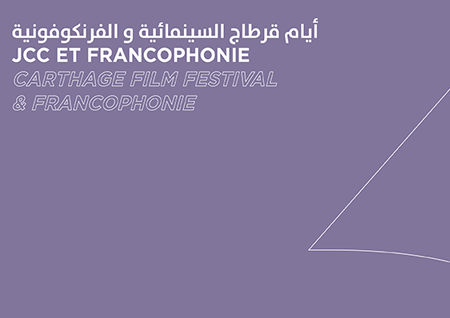 A round table was organized on JCC and the Francophonie, as part of the 32nd Edition of Carthage Film Festival (JCC), on November 3 at the City of culture. The meeting, moderated by the university teacher Issam Marzouki, was in the presence of Patricia Caillé, teacher-researcher at the University of Strasbourg, Emna Mrabet, teacher-researcher in cinema, and Baba Diop, journalist, film critic and Senegalese scholar.
A round table was organized on JCC and the Francophonie, as part of the 32nd Edition of Carthage Film Festival (JCC), on November 3 at the City of culture. The meeting, moderated by the university teacher Issam Marzouki, was in the presence of Patricia Caillé, teacher-researcher at the University of Strasbourg, Emna Mrabet, teacher-researcher in cinema, and Baba Diop, journalist, film critic and Senegalese scholar.
Diop underlined that diversity constitutes the basis of the Francophonie and no longer the language since the films are based on national languages. Cinema in the French-speaking world is not homogeneous and is characterized by its diversity, he said. Consequently, it is important to no longer evoke one cinema, but French-speaking cinemas. Belonging to a community is what unites these countries, this community needs to get stronger to promote the cinemas that make it up, he insisted. For the Senegalese critic, the Francophonie certainly supports the production of films, but the problem is the distribution of these works.
Emna Mrabet raised the issues of the definitions of Francophonie, Maghrebian film and Franco-Maghrebian film. She goes back to the history of the concept of the Francophonie, which was initially a political project. Transposed to cinema, she believes that this concept remains vague. Maghrebian films are made in the national languages. The notion of language is thus exceeded with the possibility of dubbing and subtitling.
According to the scholar, the importance of the Francophonie occurs in the field of distribution and co-production. In the absence of significant state support, Tunisian directors often resort to co-production through funds, like L’aide au cinema du monde or the Fond image de la francophonie. Despite the emergence of other partners (Sweden, Qatar, etc.), France retains a key role in co-production through the Institut français in Tunisia. Mrabet points out that the co-production impacts the distribution of the film abroad, including its selection at major festivals. She is concerned, however, about the vagaries of dependence on co-production, noting in particular that filmmakers risk falling into censorship since the writing phase, which is likely to restrict their creative freedom. This dependence also poses the problem of the future of other Tunisian films which have not benefited from co-production and which suffer from problems of visibility on an international scale. At the end, she noted the large number of festivals claiming to be French-speaking and festivals devoted to Arab and Maghrebian cinemas in France and in Europe.
For Patricia Caillé, the Francophonie is a space for contesting a certain hegemony: against an entertainment industry, genre films and an Anglophone mass culture. The Francophonie is also based on a production model with author films or social and political realism.
She cited some figures concerning the distribution of Maghreb films in France during the period between 1990 and 2019. Concerning co-produced films, the average number of admissions reached 35,000 for Moroccan films, 32,000 for Algerian films and 38 thousand for Tunisian films. The average number of admissions for films that have not benefited from co-production is divided by almost 10. On the other hand, the number of admissions with female protagonists is 66,000 admissions for Moroccan films, 82,000 admissions for Algerian films and 73,000 admissions for Tunisian films. These figures show, according to her, that the French outlook on Maghrebian cinema didn’t progress. Distribution is standardizing theaters in this country, she said. An anthropological vision also persists with an interest focused more on cultural and political questions relating to the Maghreb, and not really on a cinema film.
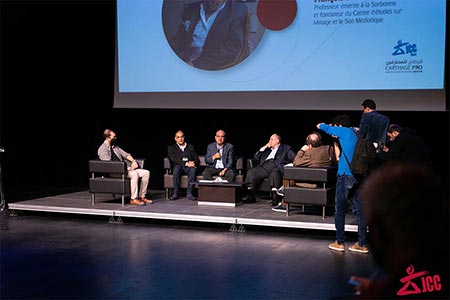 As part of the 32nd Edition of Carthage Film Festival (JCC), a platform forum was organized on Monday November 1 at the City of Culture. The speakers in this debate were the producer and distributor of films and television series, the Lebanese Sadek Sabbah, Yahia Mgarrech, co-founder of the Tunisian streaming platform Artify, the Tunisian distributor and operator of cinemas, Lassaad Goubantini, and the professor emeritus at the Sorbonne and founder of the Center for Studies on Image and Media Sound, François Jost. The forum was moderated by Hammadi Bouabid, university teacher and director.
As part of the 32nd Edition of Carthage Film Festival (JCC), a platform forum was organized on Monday November 1 at the City of Culture. The speakers in this debate were the producer and distributor of films and television series, the Lebanese Sadek Sabbah, Yahia Mgarrech, co-founder of the Tunisian streaming platform Artify, the Tunisian distributor and operator of cinemas, Lassaad Goubantini, and the professor emeritus at the Sorbonne and founder of the Center for Studies on Image and Media Sound, François Jost. The forum was moderated by Hammadi Bouabid, university teacher and director.
The forum was organized in a context where audiovisual media are gaining ever more ground, what constitutes a threat to dark rooms.
The issues raised by the forum were centered on the situations of platforms around the world and their role in popularizing access to cinema to a large audience. The speakers wondered about the contribution of these supports to promote, or on the contrary endanger, the film industry but also to strengthen North / South exchanges.
In the Tunisian context, the questions that arose concerned the place of the film industry with the arrival of these platforms. Knowing that in Tunisia, Artify is the only national platform in the international SVOD market. Especially since the legal and financial framework for these supports still needs to be shaped.
François Jost presented how the cinema was evolving before the emergence of platforms. According to him, this is not the first time that cinema has been put in competition with other media. It is the same between cinema and television. He described an audiovisual world overwhelmed by streaming, podcast, replay, and other VOD. These platforms, according to the French expert, have made it possible to circumvent the rigidity of traditional financing and distribution channels by creating other possibilities for young creators, thus contributing to the democratization of storytelling. However, television remains the real competitor of cinemas.
M. Sadek Sabbah noted that the platforms could provide additional funding for film production. Sayed Fouad, the director of the Luxor festival, underlined that it would also allow better distribution of films from the Arab region facing the low number of cinemas.
Hammadi Bouabid believes that cinemas and platforms have different audiences. These media have not really diverted cinema attendance to digital. Platforms would not threaten cinema if they pay copyright fees and are legal, added Lassaad Goubantini. The real threats are illegal websites. He notes, however, the absence of a legal framework for these platforms, and the lack of a media chronology. This assumes that the film is screened in cinemas, television and then streaming platforms.
The co-founder of Artify presented the economic model of his site, citing some figures on its attendance. Thus, the film “Look at me” by Néjib Belkadhi reached 9,000 views followed by the film “Dachra” by Abdelhamid Bouchenak with 7,000 views. He also indicated that only 10% of its content is monetized. Yahia Mgarrech has let it be known, finally, that his platform will soon be active, covering the entire Maghreb region.
The artistic director of the JCC, Kamel Ben Ouanes, concluded by stressing that the first priority remains the possibility of making films. The issue of their dissemination is subsequent. According to him, the specificity of cinema from the South (author cinema, socially anchored and seeking a new aesthetic) means that its vocation is not commercial.
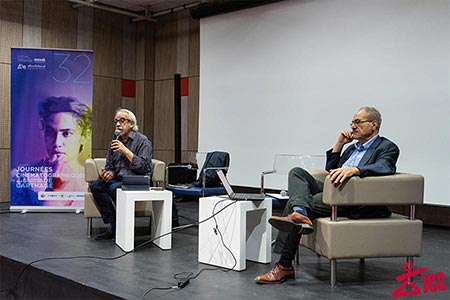 A masterclass was organized, as part of the 32nd Edition of Carthage Film Festival (JCC), on Tuesday November 2 at the City of Culture. This masterclass was facilitated by the university teacher and director, Hamadi Bouabid and in the presence of the director of photography (DOP), Tarak Ben Abdallah, who summarized his background: the transition from the national engineering school to cinema but also his cinematographic influences and so on. After a distinguished career in Italy, the DOP participated in several Tunisian and international films, such as “Clay Dolls” by Nouri Bouzid or “The Legend of Kaspar Hauser” by Davide Manuli.
A masterclass was organized, as part of the 32nd Edition of Carthage Film Festival (JCC), on Tuesday November 2 at the City of Culture. This masterclass was facilitated by the university teacher and director, Hamadi Bouabid and in the presence of the director of photography (DOP), Tarak Ben Abdallah, who summarized his background: the transition from the national engineering school to cinema but also his cinematographic influences and so on. After a distinguished career in Italy, the DOP participated in several Tunisian and international films, such as “Clay Dolls” by Nouri Bouzid or “The Legend of Kaspar Hauser” by Davide Manuli.
Tarak Ben Abdallah talked about the peculiarities of DOP profession, as the corollary relationship between image and story, and the phases of cinematographic creation (elements of composition, equipment, sensitometry, colometry, etc.). He also underlined the challenges that he is facing like the requirements of certain shootings for speed and efficiency. According to Ben Abdallah, the specificity of the direction of photography requires a certain mental elasticity.
Describing himself as a craftsman rather than an artist, the DOP reiterated the need to master the profession rules instead of trying to break them, thanks in part to academic training. However, he prefers not to talk about rules but about phenomenology and positioning. Recommending rigor, the DOP also advocates the need for ideology, specific to the director of photography, when exercising his profession.
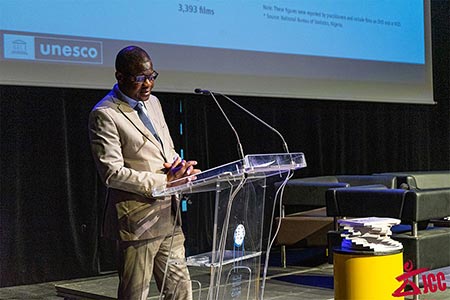 A Qualitative and Quantitative Mapping of a Complex and Complicated African Cinema
A Qualitative and Quantitative Mapping of a Complex and Complicated African Cinema
The 32nd Edition of Carthage Film Festival (JCC) was an opportunity for Unesco to present its report on cultural and creative industries. The title of the report is “The African Film Industry: Trends, Challenges and Growth Opportunities”. The presentation of thisreport took place on November 2 at the City of Culture, in the presence of the director of the JCC, Ridha Behi and the artistic director of the festival, Kamel Ben Ouanes, in front of an audience of Tunisian and Africans film lovers and critics.
The report contains 217 pages and is available in French and English. It was presented by Toussaint Tiendrebeogo, Chief of the Diversity of Cultural Expressions Entity. Ahmed Zaouche, Programme Manager at UNESCO, moderated the conference.
Tiendrebeogo explained the difficulties encountered by Unesco in preparing this report. He raised, in particular, the lack of collaboration of the official authorities. Add to that the impact of the Covid-19 on the film industry by closing theaters and postponing the majority of production activities. The report does not cover the entire African continent but provides some relevant indicators.
The representative of the Diversity of Cultural Expressions Entity indicated that African cinema is generally deprived of funding. Developments and evaluations are needed. The amount allocated to production does not exceed $ 5 billion each year out of a potential turnover estimated at $ 20 billion, according to the Pan African Federation of Filmmakers (FEPACI). According to this report, only 44% of African countries have a film commission, like Morocco, Tunisia, South Africa and Senegal. Only 55% have a film policy. But the laws governing the sector have sometimes become among the obstacles preventing its development.
The Unesco report further emphasized that at least 50% of the sector’s potential turnover disappeared due to the illegal exploitation of creative audiovisual content.
The UN expert unveiled a set of issues that have emerged recently. Among them, the low participation of women (less than 10%). In many Arabic-speaking and English-speaking African countries such as Tunisia, Morocco, Nigeria, Kenya, South Africa and Zimbabwe, the number of women is more notable with around 30% of women working in front of and behind the camera.
The report also notes that Africa’s cultural roots are not sufficiently addressed.
Regarding infrastructure in the film and audiovisual value chain in Africa, the distribution sector deteriorated with a total of 1,651 screens, or one for every 787,402 inhabitants. However, there is a glimmer of hope in new French investments in French-speaking West African countries, Morocco and Tunisia. These investments are expected to triple the number of screens in the region by 2024.
The report was subject to debate. The participants raised in particular shortcomings in the preparation of the report, which mainly concern the failure to take into account a large panel of actors, from the world of film professionals and civil society. The speakers deplored the fact that the UN organization was satisfied with the contribution of the official authorities. Consequently, the statistics are incomplete, they said. The participants also talked about the issue of film archiving in Africa in the absence of film libraries in most African countries. They also regretted the non-existence of a legal framework governing the sector and the marginalization of the issue of film criticism.
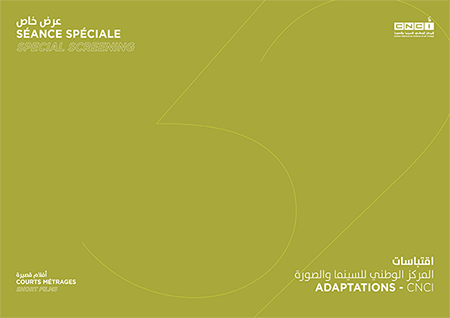 On the sidelines of the 32nd Edition of the Carthage Film Festival (JCC), the National Center for Cinema and Image (CNCI) issued a call for tender to select four film production companies for the executive production of four short films. Under the banner of “Cinematographic adaptations inspired by the Tunisian literary heritage”.
On the sidelines of the 32nd Edition of the Carthage Film Festival (JCC), the National Center for Cinema and Image (CNCI) issued a call for tender to select four film production companies for the executive production of four short films. Under the banner of “Cinematographic adaptations inspired by the Tunisian literary heritage”.
The four short films are “Salwa” directed by Ines Ben Othman, “Passion littéraire” by Sonia Zarg Ayouna and Ibrahim Letaief, “Pomme d’Amour” by Fares Naanaa and “Rira bien…qui…” by Hassen Marzougui.
“Salwa” is adapted from the short story “Wahm Laylet El Hob” (“The illusion of a night of love” in English) by Lassaad Ben Hassine. The film paints the portrait of Salwa, a young prostitute, who takes a leave to look for a night of love and try to restore her childish side. Film Duration: 13 min.
“Passion littéraire” is based on the short story “Sajine El Riwayet” (“The prisoner of novels” in English) by Lassaad Ben Hassine. The film relates the story of Majdi, passionate about literature. This passion drives him to crime. Film Duration: 18 min.
“Pomme d’amour” is inspired by Ali Douagi’s short story “Nihayet Azeb” (“A Celibate End” in English). In a fantasy world reminding heaven, the film depicts the trial of Adam and Eve after stealing the forbidden fruit. In this court, the current issues are adapted to the described context in a comical spirit. Surprisingly, the verdict is in. Film Duration: 15 min
“Rira bien…qui…” is inspired by the short story of Lassaad Ben Hassine “Junoon Osstedh” (“The madness of a teacher” in English). The film relates the story of a newly appointed teacher, who bought a second-hand car. When he met a real estate agent to rent a house, people are suddenly kind and friendly at the only sight of his car : the agent, the home owner, the neighbor, the neighborhood grocer’s, the impound officer (Changuel), and many others. Film Duration: 15 min.
The screenings are scheduled as follows:
- Thursday, November 4 at 9:30 p.m. at the City of Culture (The Opera Theater)
- Friday, November 5 at 7:00 p.m. at Le Mondial
- Saturday, November 6 at 7:30 p.m. at Le Parnasse
 Following the doldrums imposed by the Covid-19, Carthage Film Festival (JCC) made a strong come back. Under the banner of “Let’s dream, Let’s live”, the JCC 2021 is intended to be a celebration of art, creativity, cinema and life.
The honorable guests of the JCC shone on the red carpet for a colorful opening ceremony, orchestrated by the brilliant, Nejib Belkadhi.
Following the welcome addressed to the festival guests, present in large numbers, Ridha Behi, the director of the JCC, invited the guests to enjoy the festival but also to all persons constituting the heartbeat of the JCC, namely, the faithful public of this cinematographic meeting, the professionals of this industry, the journalists and all the players taking part in the influence of the festival. Defying all obstacles, the JCC organizers promise a week marked by vitality, wealth and dreams.
Following the doldrums imposed by the Covid-19, Carthage Film Festival (JCC) made a strong come back. Under the banner of “Let’s dream, Let’s live”, the JCC 2021 is intended to be a celebration of art, creativity, cinema and life.
The honorable guests of the JCC shone on the red carpet for a colorful opening ceremony, orchestrated by the brilliant, Nejib Belkadhi.
Following the welcome addressed to the festival guests, present in large numbers, Ridha Behi, the director of the JCC, invited the guests to enjoy the festival but also to all persons constituting the heartbeat of the JCC, namely, the faithful public of this cinematographic meeting, the professionals of this industry, the journalists and all the players taking part in the influence of the festival. Defying all obstacles, the JCC organizers promise a week marked by vitality, wealth and dreams.
According to Ridha Behi, this festival is an opportunity to bury, at least for a few days, the hatchet, to go of resentments and hostilities to fully appreciate fascinating works and get back to basics: cinema.
Some of these films will be judged by the Jury première œuvre of Tahar Cheriaa prize, which will be launched. This jury is composed of Sékou Traoré, from Burkina Faso, Basma from Egypt, and Ramses Mahfoudh, from Tunisia.
The jury for feature and short documentaries is composed of Chloé Aicha Boro from Burkina Faso, Nujoom Al-Ghanem from the United Arab Emirates, Sophie Salbot and Michelle de la Rochefoucauld from France, Hamza Ouni from Tunisia and Necati Sonmez, from Turkey.
Hayet Guettat Guermazi, Minister of Cultural Affairs, also intervened on stage to underline the importance of the JCC in revitalizing the Tunisian, Arab and African cultural life. The Minister reaffirmed the full support of culture ministry for Tunisian cinema. “The festival remains a pillar of cultural activity in Tunisia and in all the southern countries”, as she emphasized. She also insisted on the need to strengthen cooperation between the southern countries and the southern countries with the northern ones, as well as the role of cinema in protecting society and contributing to its progress.
Later followed tributes paid to figures who have honored Tunisian, Arab and African cinema through their exceptional career: the Egyptian actress Nelly Karim, the film critic Baba Diop, the producer Anoir Sadek Sabah and the film critic and journalist Khameis Khayati.
A vibrant tribute was also paid to the Tunisian director Moufida Tlatli who sadly passed away on February 27, 2021.
The director of “The Silences of the Palace” was able to pass on her passion for cinema, inspiring a new generation of filmmakers. The JCC dedicated to them the section "Ciné promesse". The jury is composed of Lina Chaabane from Tunisia, Fatou Kiné Séné from Senegal and Nicole Kamato from Lebanon.
To support culture and free speech, the JCC launched the Lina Ben Mhenni Prize. The jury is composed of Bochra Bel Haj Hmia and Hechmi Ben Fraj from Tunisia and Sarah Berthou from France.
Special tributes will also be paid to makeup artist Hajer Bouhawala, head-machinist Hsan Tebbi, actor Bahri Rahali and actress Chekra Rammah.
The jury of “Fiction feature and short films” composed of Hoji Fortuna from Angola, Tarek El Shennawi from Egypt, Gessica Fabiota Geneus from Haiti, Daoud Aoulad-Syad from Morocco, Ahmed Bahrami from Iran, Sofiane Ben Farhat from Tunisia and presided by the Italian producer Enzo Porcelli went on stage, reflective of the diversity promoted by the festival.
The opening ceremony ended on a high note with the presentation, by its own director, Mahamet-Salah Haroun, of the opening film “Lingui, The Sacred Bonds”.
At the end, the guests had the opportunity to discover this gripping film.
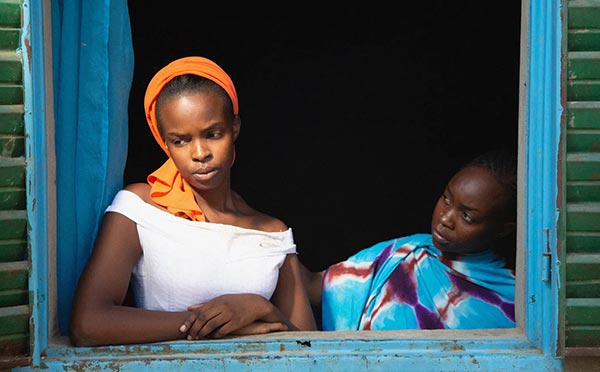 The Chadian film “Lingui, The Sacred Bonds” was the Opening Film of the 32nd Edition of Carthage Film Festival (JCC) which started on October 30, 2021.
The Chadian film “Lingui, The Sacred Bonds” was the Opening Film of the 32nd Edition of Carthage Film Festival (JCC) which started on October 30, 2021.
Directed by the Chadian filmmaker Mahamat Saleh Haroun (2021), the film paints a poignant family drama. In N’Djaména - the capital of Chad -, Amina a single mother, is raising her 15-years-old daughter in harsh conditions. She decided to secure an abortion to his pregnant daughter and fought to protect her. This act is not without risk in a country where abortion violates both religion and law. The director thus paints the overwhelming journey of women who struggle to wrest their rights.
The director Mahamat-Saleh Haroun has won several awards in international festivals: In Venice, with the grand special jury prize for “Daratt”, in 2006, in Cannes, with the jury prize for “A Screaming Man”, in 2010 and “Grisgris”, in 2016. In 2015, he presented, during a special screening, “Hissein Habre, A Chadian Tragedy”, a striking documentary on the Chadian dictator Hissein Habré's reign of terror, that lasted from 1982 to 1990.
The artist also was Chadian minister of culture from February 2017 to February 2018. “Lingui, The Sacred Bonds”, marked the return to his vocation as director after his last film “A Season in France” (2017).
The projection of “Lingui, The Sacred Bonds” at the opening of the 32nd edition of the JCC marks the beginning of the screening of films in the spirit of intensity and commitment.
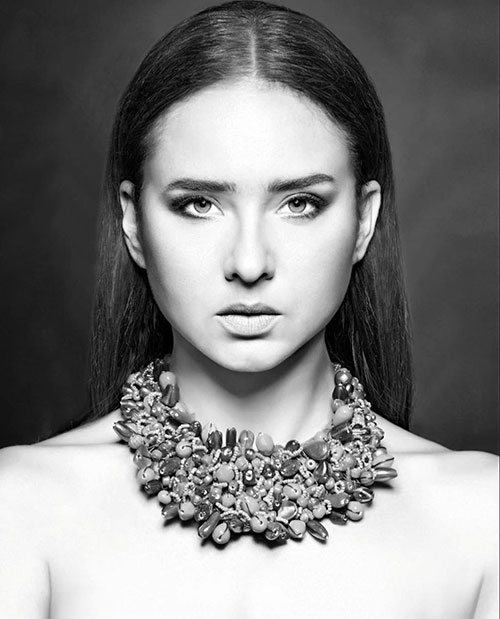 The 32nd Edition of Carthage Film Festival starts Saturday, October 30, 2021 at 5.30 p.m. Many Tunisian, Arab, African, etc. figures from the world of cinema will be present.
The 32nd Edition of Carthage Film Festival starts Saturday, October 30, 2021 at 5.30 p.m. Many Tunisian, Arab, African, etc. figures from the world of cinema will be present.
The Egyptian actress Nelly Karim will be among the personalities honored at the opening ceremony. This tribute will be paid to her exceptional artistic career. Nelly Karim starred in many movies by renowned Egyptian directors, such as “Alexandria New York” by Youssef Chahine, “Clash” by Mohamed Diab, “One-Zero” by Kamla Abu Zekry, “The Blue Elephant” By Marwan Hamed, “Akher eldonia” by Amir Ramses and many others.
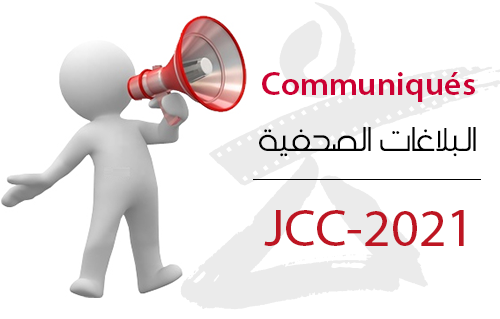 JCC 2021 Health Protocol:
JCC 2021 Health Protocol:
The protocol explanatory guide is available to journalists on the official JCC website.
In order to ensure the smooth running of the festival, we rely on your kind cooperation to respect the mandatory sanitary measures.
Arrival and Transport:
Upon your arrival at Tunis-Carthage Airport, our hosts and hostesses will welcome you, take care of entry formalities to Tunisia and customs procedures and will assist you in collecting your luggage.
Then our Welcome and Hospitality team will ensure your transfer from the airport to the hotel.
When you arrive at the hotel, you will receive the festival tote bag containing various catalogs for the 2021 session, information on activities, your press badge and your restaurant tickets / vouchers valid for the duration of the festival.
Accreditation/Information:
Journalists and media photographers accredited by the Carthage Film Festival (JCC) must show up at the Media-Center of the festival in order to collect the MEDIA badges and the various documents useful for covering the events of the festival.
(MAPPING of the Media Center: at the Africa hotel)
The JCC 2021 MEDIA badge, personalized with the identity photo, surname and first name, allows its holder to access the cinemas (journalists’ tickets are available on Teskerti according to the authorized quotas and the capacity of the cinemas). The badge offers free access to the media center, the various press briefings, debates and conferences.
We kindly ask you to keep your badge visible when you move during the festival and not to give it to a third party.
Media Access:
As a member accredited to cover the festival and holder of the JCC 2021 press accreditation, you have free access to the following spaces and events:
- Press Center
- Film screenings (depending on the number of places available for journalists, to be reserved in advance one day before the festival for the entire festival period)
- Daily press briefings
- Debates-forum
- Conferences
Press Office:
The press office (Media Center) is located at Hotel Africa - Avenue Habib Bourguiba 2nd floor.
The MEDIA CENTER is open daily to all accredited journalists and media, throughout the festival.
- The Media Center is an equipped space, dedicated to journalists, to hold press briefings, meetings, debates, etc…
- This space is made available to journalists dedicated to relax and enjoy conviviality, as well as a space for working and sharing in calm and serenity between screenings and interviews ...
The festival ensures you the best conditions for your coverage of the 32nd Edition of the JCC by respecting the following rules:
- The Press Office is open to all journalists wearing their press badges.
- The organizers are not responsible for any forgetting, damage or loss of material in the Media Center.
Interview requests:
- To register your requests for interviews with the festival organizers, filmmakers, actors and personalities, contact the press office directly. The interview request will be made on your behalf, specifying the artist interviewed and the accredited media.
- In order to coordinate the various activities of the press office according to the daily schedules, we ask you to register interview requests in advance with the persons concerned with a minimum delay of 24 hours.
- The press team is working to follow up on all recorded interview requests. However, confirmation of the appointment will depend on the availability of the person concerned (filmmaker, celebrity and / or the executive committee.)
- Please note that all interviews will take place at the Media Center in Cité de la Culture. If you would like to record an outdoor interview, please notify the Press Office to provide you with permits. This request must be made 48 hours before the date of the interview.
Press Screenings:
Press screenings will take place from Sunday, October 31 to Wednesday, November 3 in the Tahar Cheriaa Hall. You will find attached the program of the proposed screenings.
JCC in prisons:
Journalists wishing to cover screenings of JCC in Prisons 2021 are requested to provide their CIN (or passport for foreign journalists).
To have access to these special JCC screenings in prisons, contact Mr Hatem Boukesra by phone +21625790071 or by email hatem.boukesra@gmail.com
Red Carpet, Access & Procedures:
Accredited journalists have access to the red carpet (Zone B and Zone C) on compulsory presentation of their badge.
Journalists having access to the red carpet are advised to arrive between 4:30 p.m. and 5:45 p.m. for the opening and closing ceremonies.
The entry point is at the Z4, access to the car park and the Red Carpet is installed at the entrance hall level 0 for photographers (at shop levels) (Zone B).
All JCC guests are invited to stop for interviews at the Wall of Fame (Zone C) which is located in the foyer of the Opera Theater. However, as with any major media event, photos and interviews are at the convenience of the guests.
Please note that the badge does not grant access to the opening or closing ceremonies. It will be by invitation only.
Special mention for photographers and cameramen: Accredited journalists wishing to cover the opening and closing ceremonies of the JCC 2021 should contact the press office to obtain a cover badge allowing access to the red carpet.
The invitations will be sent by email by the department concerned.
Dress Code:
The official dress code for the opening and closing of the JCC is: Formal outfit (Gala outfit or Black tie)
Audiovisual Content:
The JCC audiovisual team ensures the capture and recording of all Festival events.
The audiovisual content will include: photo and video captures of celebrities, the red carpet walk, guest arrivals, general photos of the festival, coverage of all media events: press conferences, general atmosphere before and after the film screenings, etc. ...
Images and videos of the events will be available on the JCC official website.
For any assistance or additional information, please contact the JCC Press Office.
Public Screening Tickets: Media Privilege:
All journalists and media representatives having the JCC 2021 badge will have access to film screenings subject to the availability of the quota reserved for journalists. The tickets must be reserved at the online ticket office Teskerti: www.accreditationjcc.teskerti.tn will be available from October 29
Or at hotel Africa 2nd floor
Tickets are available depending on the quota.
You will be able to collect tickets for the entire festival period.
The Media badge gives access to 3 tickets (to be collected on presentation of the media badge)
(That is, you will have access to 3 tickets for 3 films / day using your media badge and this according to the quota available for journalists)
 We inform the JCC’s public that the tickets of the 32nd session will be
available as follows:
We inform the JCC’s public that the tickets of the 32nd session will be
available as follows:
Online purchasing allows you to reserve seats in advance for all the
festival films with a maximum of 3 tickets each transaction.
The box office purchase allows to get the tickets only for the day’s
program and the following day with a maximum of 3 tickets for each
person.
It is recalled that according to the sanitary provisions:
• the cinema will only accommodate 50% of their capacity.
• We only accept vaccinated people (present a certificate)
The tariffs applied: 2 TND for pupils and students. 3 TND for adults
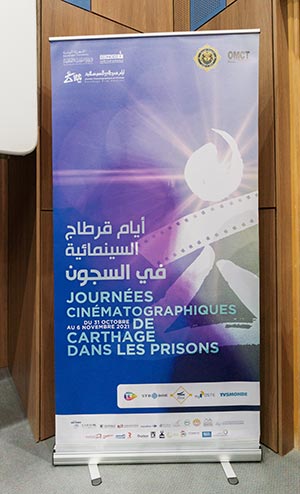 The seventh session of the Carthage Film Days in Prisons was held on Wednesday, October 20 at 9:30 am 2021 in the City of Culture, at Taher Chariaa Hall, in the presence of Nizar Salam, a representative of the General Directorate for Prisons and Rehabilitation, Mr. Ridha El Behi, Director of the Carthage Film Festival, Ms. Gabriel Reiter, Director of OMCT in Tunis and Mr. Slim Darguechi, Director of CNCI.
The seventh session of the Carthage Film Days in Prisons was held on Wednesday, October 20 at 9:30 am 2021 in the City of Culture, at Taher Chariaa Hall, in the presence of Nizar Salam, a representative of the General Directorate for Prisons and Rehabilitation, Mr. Ridha El Behi, Director of the Carthage Film Festival, Ms. Gabriel Reiter, Director of OMCT in Tunis and Mr. Slim Darguechi, Director of CNCI.
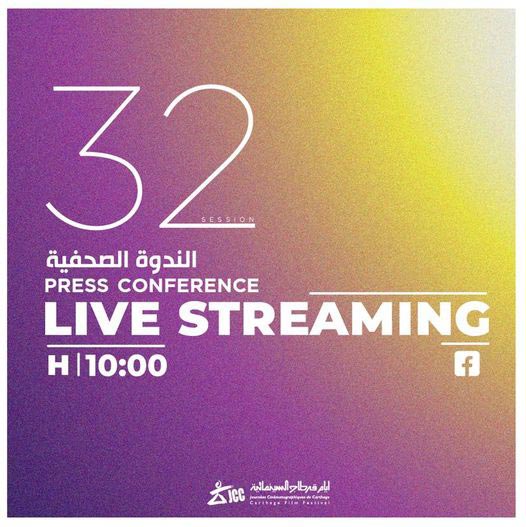 On Tuesday October 12, 2021, the JCC organized a press conference to reveal the details of the 32nd edition of the festival which will be held between October 30 and November 6. And it was in the presence of a large audience of journalists, that the general director of the JCC, Ridha Behi, exposed the most important novelties of this edition.
On Tuesday October 12, 2021, the JCC organized a press conference to reveal the details of the 32nd edition of the festival which will be held between October 30 and November 6. And it was in the presence of a large audience of journalists, that the general director of the JCC, Ridha Behi, exposed the most important novelties of this edition.
Besides the “JCC in prisons” and “JCC in the regions” sections, this new edition innovates with the “JCC in barracks”. As well as with two new awards: Lina Ben Mhenni, figurehead of the Tunisian revolution, and another in the name of the Lebanese filmmaker Sadek Anwar Sabbah. To further promote its regional influence, cinephiles are invited from other cities to share the festival experience, in addition to film screenings there. The 2021 Edition has 11 sections: 750 Arab and African films compete in this edition (200 feature films, 550 short films). 18 Tunisian feature films are registered (9 documentaries and 9 fictions). 36 short films (5 documentaries and 31 fictions) will be screened. 45 countries will participate in this edition including 28 African countries and 17 Arab countries.
Kamel Ben Ouanes, the JCC artistic director, underlined the pioneering role of the festival in the Arab and African cinematographic scene, even though the large number of films in this edition. He also outlined the selection criteria for these films, which are: the degree of innovation and aestheticism of cinematic storytelling, in terms of both format and content. The second criterion is that the film should target the audience of the JCC: Cinephile and discerning. As declaimed by Mr. Ben Ouanes, in the JCC, "The audience is the star", which excluded commercial films. The third criterion is that these films can create channels of exchange and communication between the filmmaker and the audience.
Chadian filmmaker Mahamat-Saleh Haroun’s film “Lingui: The Sacred Bonds” will be the opening film. The classical sections are programmed, like “Regard sur le cinema tunisien”, “Cinéma du monde”, spotlight on two countries: Belgium and Libya (North-South), both enjoy cinematographic liveliness.
Numerous workshops and roundtables will be organized to discuss the main current issues of cinema, and to provide perspectives.
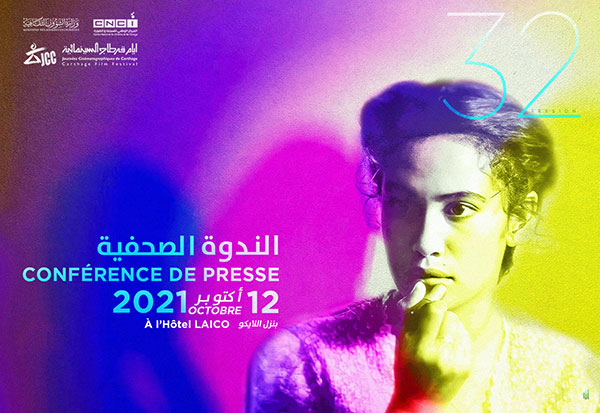 Press conference
Tuesday, October 12, 2021
Laico Hotel
Press conference
Tuesday, October 12, 2021
Laico Hotel
The JCC are organizing a press conference to reveil the details of the 32nd edition on Tuesday, October 12, 2021 from 9:30 am at the Laico hotel.
Please wear a mask and keep your social distance in order to respect the health protocol
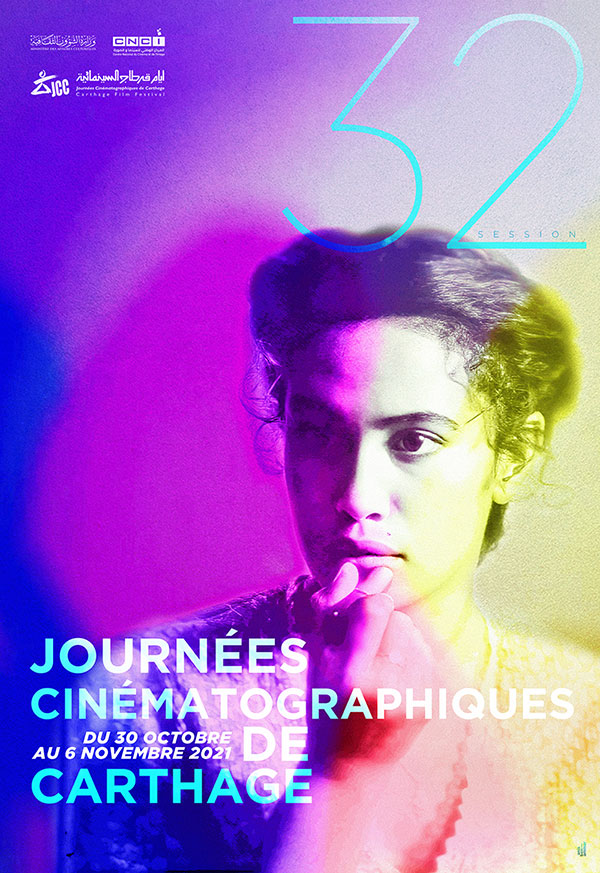 The official poster of the 32nd Edition designed by Anis Ben Ammar, is unveiled. Artist, graphic designer and university teacher, Anis is above all passionate about art and culture with long and rich experience.
The official poster of the 32nd Edition designed by Anis Ben Ammar, is unveiled. Artist, graphic designer and university teacher, Anis is above all passionate about art and culture with long and rich experience.
The composition and color balance of the poster, express, through the cinematographic prism, the abundance of life: warm, intense, vibrant and joyful. The message is clear: Carthage Film Festival spreads joy and happiness in the streets of our cities.
Starred by our child star, Hend Sabri, it's through a melancholical portrait, a tribute to Moufida Tlatli: The silence-silence des palais- of this strong and precious woman, wearing kohl and putting red lipstick on, suggests that she's putting on her pretty face for the spectator… for the Cinema.
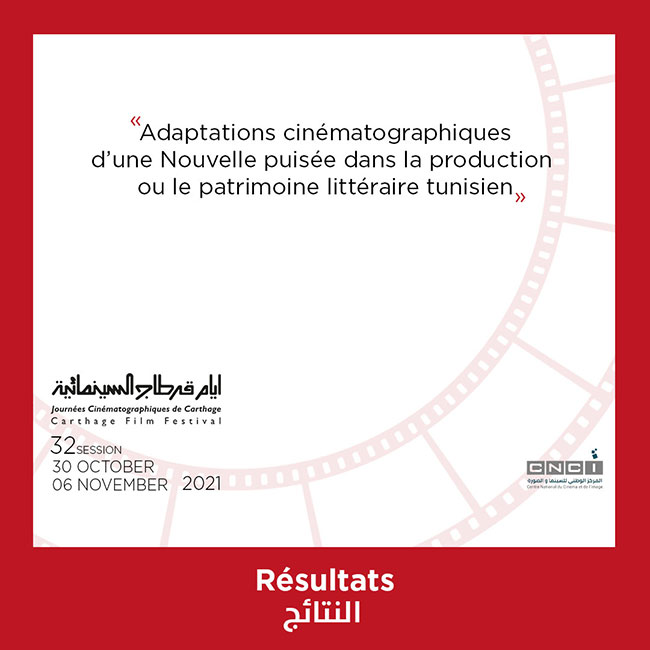 Dans le cadre de la 32ème édition des JCC, le CENTRE NATIONAL DU CINÉMA ET DE L’IMAGE (CNCI) a lancé un appel d’offre pour choisir quatre sociétés de production cinématographique pour la production exécutive de quatre court-métrages sous le thème:
Dans le cadre de la 32ème édition des JCC, le CENTRE NATIONAL DU CINÉMA ET DE L’IMAGE (CNCI) a lancé un appel d’offre pour choisir quatre sociétés de production cinématographique pour la production exécutive de quatre court-métrages sous le thème:
« Adaptations cinématographiques d’une Nouvelle puisée dans la production ou le patrimoine littéraire tunisien» .
la durée des court-métrages est entre 13 et 25 minutes
un comité a sélectionné les quatre court-métrages suivants:

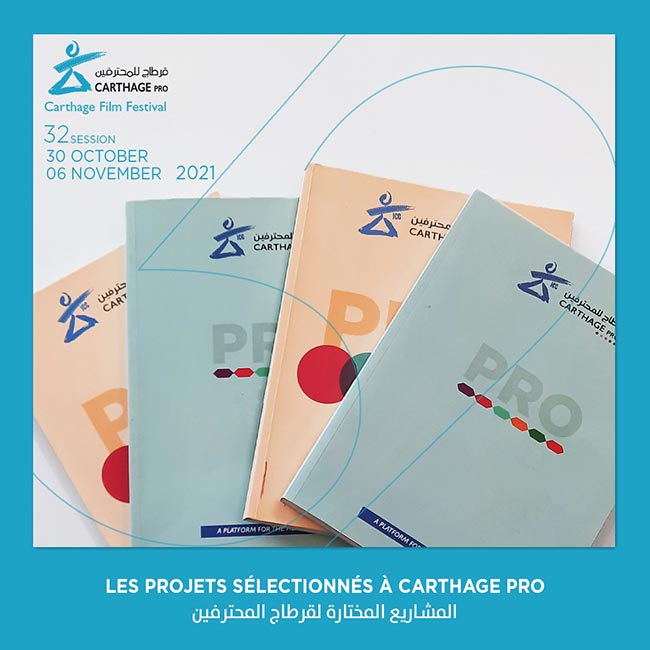 Depuis sa création en 2014,Takmil a soutenu 47 projets en phase post production. Quant à Chabaka, et depuis que cet atelier est devenu compétitif depuis 2018, 11 projets en développement ont été soutenus.
Depuis sa création en 2014,Takmil a soutenu 47 projets en phase post production. Quant à Chabaka, et depuis que cet atelier est devenu compétitif depuis 2018, 11 projets en développement ont été soutenus.
Nombreux sont les films sélectionnés qui ont connu une carrière internationale, primés dans des festivals et dans des plateformes professionnelles.
Cette année les ateliers se tiendront du 1er au 3 novembre 2021.
Grâce au soutien de nos partenaires qui n’ont pas hésité à répondre présent, des bourses d’aide seront octroyées par un jury international.
Cette année nous avons reçu 79 projets en développement dans le cadre de Chabaka dont 14 projets tunisiens, le comité a sélectionné 8 projets.
31 Films en phase de post production dans le cadre de Takmil ont été déposés dont 4 tunisiens et sont sélectionnés 7 projets.
Ont été retenus entre documentaire et fiction les films suivants :
Les projets sélectionnés à l’atelier Chabaka
1- Titre : une famille respectable/ a respectable family -
Fiction
Pays : Tunisie
Réalisatrice : Ismahane Lahmar
Producteur : Rashid Abdelhamid
2- Titre : Dar el Bacha sur la voie des Lumières -
Documentaire
Pays : Tunisie
Réalisateur- Producteur : Nawfel Saheb- Ettaba
3- Titre : Je ne m'appelle pas Asmahan/ My name is not Asmahan -
Fiction
Pays : Tunisie
Réalisatrice : Nidhal Guiga
Producteur : Nawfel Saheb- Ettaba
4- Titre : The killing of a beast/ Le meurtre d’une bête -
Fiction
Pays : Afrique du Sud/ South Africa
Réalisateur : Vusi Africa
Productrice : Naledi Bogacwi
5- Titre : Mehal Safari -
Fiction
Pays : Ethiopie/ Ethopia
Réalisateur : Abraham Gezahagne
Productrice : Tamara Mariam Dawit
6- Titre : Ourjouwan -
Documentaire
Pays : Liban
Réalisatrice : Joelle Abou Chabké
Productrice : Marine Vaillant
7- Titre : Donga -
Documentaire
Pays : Lybie
Réalisateur- Producteur : Mohannad Alamin
8- Titre : Le Chameau Manquant/ The Missing Camel -
Documentaire
Pays : Mauritanie
Réalisateur : Cheikh N’diaye
Productrice : Ilham Raouf
Les films sélectionnés à l’atelier Takmil
1- Titre : L'Arbre du Soir / The Evening Tree -
Fiction
Pays : Tunisie
Réalisateur : Adel Bakri
Producteur : Adel Bakri
2- Titre : La couleur du phosphate/ The color of phosphate -
Documentaire
Pays : Tunisie
Réalisateur : Ridha Tlili
Producteur : Ridha Tlili
3- Titre : Une maison pour Buster Keaton/ A home for Buster Keaton -
Documentaire
Pays : Algérie
Réalisateur : Lamine Ammar Khoudja
Productrice : Rebecca Houzel
4- Titre : Au cimetière de la pellicule / The cemetery of cinema -
Documentaire
Pays : Guinée
Réalisateur : Thierno Souleymane Diallo
Productrice : Martin Maud
5- Titre : Dirty, Difficult, Dangerous / 3D -
Fiction
Pays : Liban
Réalisateur : Wissam Charaf
Productrice : Charlotte Vincent
6- Titre : Haysh Maysh : False Drama -
Fiction
Pays : Maroc
Réalisateur : Hicham Lasri
Producteur : Hicham Lasri
7- Titre : Sitabaomba / Soute à bombes -
Documentaire
Pays : Madagascar
Réalisateur : Nantenaina Lova
Productrice : Eva Lova
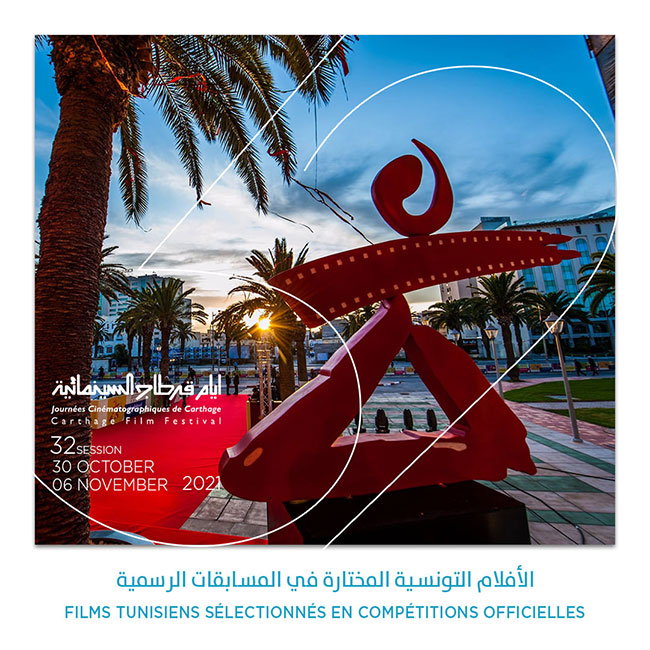 Dans le cadre de la 32 ème édition des JCC , deux comités de sélection indépendants se sont réunis pour visionner les
films tunisiens qui ont déposé leur candidature dans plusieurs sections de la compétition officielle. Ces comités ont
choisi les films tunisiens qui seront représentés au sein des compétitions officielles de la 32 ème édition des JCC.
Chaque comité de sélection est composé de quatre membres constitués d’universitaires et de critiques.
Dans le cadre de la 32 ème édition des JCC , deux comités de sélection indépendants se sont réunis pour visionner les
films tunisiens qui ont déposé leur candidature dans plusieurs sections de la compétition officielle. Ces comités ont
choisi les films tunisiens qui seront représentés au sein des compétitions officielles de la 32 ème édition des JCC.
Chaque comité de sélection est composé de quatre membres constitués d’universitaires et de critiques.
Le premier comité a visionné les longs et courts métrages de fiction.
Le second comité/ Jury s’est chargé de visionner les longs et courts métrages documentaire.
Les deux comités attestent de la qualité des 53 films candidatés pour les compétitions officielles. Les films nominés
sont répartis comme suit :
18 films longs répartis comme suit :
9 films longs métrages fiction
9 films longs métrages documentaire
34 films courts métrages répartis comme suit :
29 films courts métrages de fiction
5 films courts métrages documentaire
Après délibération les deux comités de sélection, officielles et indépendants ont sélectionné les films suivants :
Compétition longs métrages de fiction :
1- Insurrection de Jilani SAADI production MADBOX et JS productions
2- une histoire d'amour et de désir de Leyla Bouzid production Blue Monday Productions
3- Papillon d'or de Abdelhamid Bouchnak production Shkoon production et SVP
Compétition courts métrages de fiction :
1- FRIDA de Mohamed Bouhjar production Amilcar Films
2- Au pays de l'Oncle Salem de SLIM BELHIBA production KO Productions
3- Je suis Cide de Tarek SARDI production 3EME GENRE Production
Compétition longs métrages documentaire :
1- Halal Cinéma de Amine Boukhris production Aljazeera Documentary Channel et Donia Films
2- Papi, qu'as-tu fait de ta jeunesse ? de Akram Adouani production Aljazeera Documentary
Channel
3- MANCA MORO de Rim Temimi production NOMADIS IMAGES
Compétition courts métrages documentaire :
1-« Touristes Hors Saison... » de Maher Hasnaoui production Libre Production
2- festina lenta de Baya Mdhafer production JS Productions
L’annonce des films tunisiens dans les sections officielles hors compétitions se fera ultérieurement, notamment dans la
section « regard sur le cinéma » et « séance spéciale ».
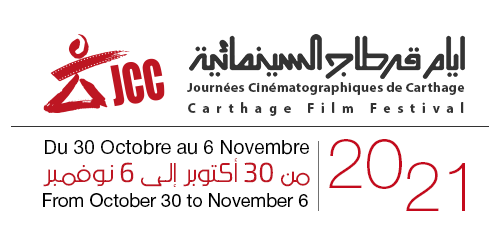 Après le succès de la session 2020 des Journées Cinématographiques de Carthage, organisées dans la tourmente de la Covid 19, le Ministère des affaires culturelles n’a pas hésité à renouveler sa confiance au réalisateur Ridha Béhi à assurer de nouveau la direction des J.C.C (session 2021).
Après le succès de la session 2020 des Journées Cinématographiques de Carthage, organisées dans la tourmente de la Covid 19, le Ministère des affaires culturelles n’a pas hésité à renouveler sa confiance au réalisateur Ridha Béhi à assurer de nouveau la direction des J.C.C (session 2021).
Ce n’est un secret pour personne que la réussite de la dernière session dans des conditions exceptionnelles : sanitaire, économique et sociale fut un grand défi de ne pas suspendre le festival, comme ce fut le cas pour d’autres manifestations internationales de grande envergure.
Sous la direction de Ridha Béhi, Le nouveau comité directeur de la session 2021, est déterminé à organiser la rencontre de l’espoir et de l’amour du cinéma, en prenant toutes les précautions sanitaires et en assurant toutes les conditions de réussite d’un festival sans failles, répondant ainsi aux attentes du public, toujours au rendez-vous de l’événement.
D’ores et déjà, l’appel à candidature est ouvert aux différentes sections. Aussi, tous les films inscrits lors de la session précédente (2020), seront pris en compte lors de la sélection de la nouvelle édition 2021.
Lien de l’appel à candidature :
Lien de l’appel à candidature : Inscriptions Films